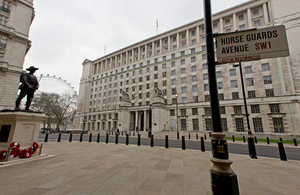Chair, Distinguished delegates,
The UK delegation is pleased to have this opportunity to set out the UK’s approach to its national legislation and to provide an update since this subcommittee last met.
By way of background, in 1986, the Outer Space Act was enacted. This has been used to regulate space activities by requiring that UK entities obtain a licence. The activities that have been regulated by the Outer Space Act are the procurement of a launch of a UK satellite on an overseas launch vehicle and the in-orbit operation of UK satellites.
In 2018, the Space Industry Act became law. This Act created an enabling framework for regulating space launch from the UK. In July 2021, the UK Space Industry Regulations which underpin the Space Industry Act were signed into law. The development of the Regulations was a cross-Government project. The regulations allow for the authorisation of a range of new commercial spaceflight technologies, including vertically launched vehicles, air-launched vehicles and sub-orbital spaceplanes and balloons taking place from the UK.
The Act will sit alongside the Outer Space Act, which will continue to apply to space activities carried on by UK entities outside of the UK. The Space Industry Act will apply to activities carried out in the UK.
Also in July 2021, the Civil Aviation Authority (the CAA) became the UK’s independent spaceflight regulator. Appointing the CAA follows the policy approach of separating safety regulation from sector promotion.
The CAA has the right technical skills and knowledge, and a strong track record in overseeing the aviation sector in the UK, one of the safest in the world, as well as experience in regulating launch-related activities under the Air Navigation Order. We hope that distinguished delegates found the presentation provided by the CAA, on Tuesday 29 March, on their approach to the regulation of UK activities, informative.
The UK remains committed to meeting our legal obligations under the United Nations Treaties on Outer Space and these are reflected in our regulatory regime. We have also used our regime to implement the UN’s 21 Guidelines for the Long-term Sustainability of Outer Space Activities and are championing their widespread implementation in our international work , including by funding a project with the UN Office for Outer Space Affairs.
We have established the Spaceflight Safety and Regulatory Council. This is a partnership between industry, government, and the spaceflight regulator to keep the Space Industry Act and regulations under review to ensure that we keep pace with technological and industry developments. The legislation is flexible enough to accommodate emerging technological advancements, market opportunities and changes to the international landscape, while keeping safety at the forefront. We will continue to develop our regime to support high growth and emerging markets such as constellations, earth observation services, in-orbit debris removal, servicing, refuelling and assembly technologies.
The UK is also committed to being transparent about our space activities and are committed to the obligations set out in the Registration Convention. Since the last legal sub-committee meeting the UK has registered 215 satellites, and has developed a more streamlined process for completing bulk registrations for satellites which are part of a larger constellation.
Furthermore, the UK has broadened and formalised its registration practices, and has implemented a national policy for the registration of satellites into our licensing process under the Space Industry Act. Prior to any launches taking place from the UK, we will seek agreements with other relevant launching States to agree the State of Registry.
The Outer Space Act, Space Industry Act and the new Space Industry Regulations set out the UK’s high-level framework on operator liability and insurance obligations. This requires operators engaging in spaceflight activities to indemnify the Government and to take-out third-party liability insurance. This provides a resource for any successful claims brought under the UN Liability Convention against the UK as launching State.
Recognising the difficulties in financially managing an unlimited liability, the liability is limited for operators who carry out their spaceflight activities in compliance with UK legislation and licence conditions.
Following a recent call for evidence, the UK Government is currently reviewing a number of liability and insurance matters raised by the UK’s space sector. This includes the use of alternatives to insurance as forms of security to meet an operator’s liability obligations. The review is also taking into account the Government’s evolving approach to maintaining the sustainability of the orbital environment.
The publication of the UK Government response to this review will be issued later this year and the UK will provide a further update at the next committee.
The UK has significant experience in developing a new regulatory framework, and are very happy to discuss our experiences with Member States considering doing the same.
Thank you Chair.


